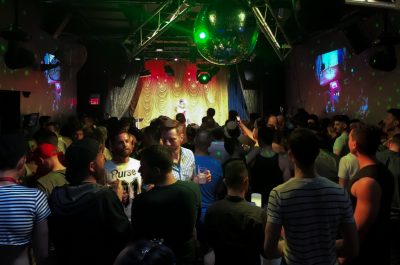After a long period of inactivity due to the pandemic and state-wide restrictions since March 2020, queer bars and nightlife spaces are starting to fully reopen, attracting individuals of all ages and identities.

Throughout the pandemic, local bars such as Back Bay’s Club Café and Dorchester’s Blend continued to engage their patrons by hosting virtual drag queen performances. But they were unable to recreate the bars’ unique social atmosphere.
“[Bars are] also a place where you meet other people in the community … you’re creating and living out your identity as a queer person in public in bars,” said Joan Ilacqua, executive director of The History Project, an organization that aims to document, preserve and share New England’s LGBTQ+ history.
The History Project has collaborated with bar workers and goers to document artifacts, photos and stories from over the years. Their collections include flyers, menus, swizzle sticks and even the original stained glass windows from The Napoleon Club: a gay piano bar near Park Square in the latter half of the twentieth century.
Since Boston has “so few distinctively queer spaces,” gay bars and clubs still function as places for the community to meet, hook up, dance and have fun, Ilacqua said.
Courtney Furno is the general manager at The Alley Bar, a gay nightclub in downtown Boston. While the club has been open since September, the bar opened in full on May 29 with celebration and relief.
“We’re accepting of all people that come through the door,” Furno said. “There are times where during the pandemic, we were the only bar in the entire area that was open, so we were getting people from out of town, of all walks of life.”
He said that in recent years, the need for gay bars as an “oasis” for queer people has waned, affecting the bars themselves. The Alley Bar had its own financial trouble during the pandemic, posting on Facebook on May 29 a tribute to their loyal patrons who “kept us open.”
“Before the bars were all about where you can feel safe and comfortable around other gay people and not have any persecution,” Furno said. “[Now] people don’t feel like this is the only place they can go, they can now go anywhere, and have a good time … It doesn’t necessarily need to be a gay bar or gay establishment to have that sense of comfort.”
In recent years, queer bars have faced many challenges, which were only worsened by the COVID-19 crisis.
Shortly before the pandemic, Fenway nightclubs Machine and Ramrod officially shut down and were demolished for the construction of a mixed-use building, which will include The Boylston Black Box, a performing arts space created by and performed for queer and trans people of color. Bella Luna & The Milky Way, an LGBTQ-friendly Italian restaurant in Jamaica Plain, permanently closed at the start of the pandemic.
Louis Lobato is the president of Mass Bears and Cubs, a non-profit that promotes inclusiveness and camaraderie in the LGBTQ+ community through social and service-oriented programming.
Many of their social events take place at queer bars in the Boston area, such as their Bear Tea event at Club Café and Bear Trivia event at The Alley Bar.
“Our gay bars are still our safe spaces,” Lobato said. “That’s a place where we can go meet people like us and be comfortable.”
Ilacqua said many people “reminiscence” about gay and lesbian bars of the past — at the height of the gay bars in the 1970s and ’80s, LGBTQ+ individuals relied on those spaces for a sense of community.
“When you come out … there are very few places where you’re surrounded by other queer people,” Ilacqua said. “It’s almost like going to church to be surrounded by people who are part of your community, who are dealing with some of the same things that you are dealing with in your everyday life.”
The reopening of queer bars after the pandemic — and other social spaces — comes with challenges, Lobata said.
“When it comes to any form of gathering place … it takes a little longer and I think that’s something that we’ve all seen and are learning to accept,” Lobato said. “Let’s respect the servers that are helping us, the venue, management and owners that are trying to schedule and relearn the cycle of business again because once again, we’re all learning this all over again.”
Sustaining these gathering spaces is important to queer communities and society as a whole, Ilacqua said.
“They’re a community space. You go to a bar to get a drink, to see your friends, to hook up, to comment on other people’s outfits, to dance, to listen to DJs, to go see drag queens,” she said. “That back out in public in full force is a return to normal.”
Molly Farrar contributed to the reporting of this article.


















































































































